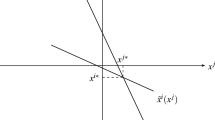Abstract
We consider a pollution permit sharing problem: there are a finite number of countries and each country owns a fixed amount of permits and a technology. Each country’s output production is limited by the amount of permits it has and the permit is the only input for the technology. Permits are considered as rival goods and are perfectly transferable between countries. Technologies are nonrival but exclusive. Efficiency requires the permits to be able to be reallocated between countries so that the joint total production is optimal. The main question is how to share the total optimal output. A solution assigns to each permit sharing problem an allocation of the optimal output between the countries. In this paper, we consider two upper bounds for a solution. We define two coalitional games. The aspiration upper bound with given technologies (AUBT) game assigns to each coalition the optimal output the coalition can generate using the permits available from all the countries with the technologies available to the coalition. The aspiration upper bound with given permits (AUBP) game, on the other hand, assigns to each coalition the optimal output the coalition can generate using the technologies available from all countries with the permits available to the coalition. These two games define two natural welfare upper bounds for a solution. We show that both the AUBT and the AUBP games are concave (Theorems 1, 2). The Shapley values of these two games satisfy the two welfare upper bounds, respectively.
Similar content being viewed by others
Notes
See Raupach et al. (2014) for more on some allocation rules used in practice.
Ambec and Sprumont (2002) consider a similar aspiration upper bound game in a river water sharing problem.
See Sect. 5 for more discussions about the AUBP game. We thank the referees for raising the question about the relevance of the AUBP game in the permit sharing problem.
By this assumption, we ignore any local negative welfare effects from pollution due to the production.
Although they look similar, the permit trading solution should not be mistaken for the commonly known Cap and Trade solution in emission reduction, which attempts to achieve the goal of emission reduction at the lowest possible cost. Here we consider a different problem in which permits are treated as inputs in the production of output and our question is how to share the total optimal output given by the efficient allocation of the permits (inputs).
Under the assumption on the production functions of the agents, it can be shown that \({\overline{P}}(t)\), as a function of t, is strictly increasing and continuously differentiable. That function \({\overline{P}}(t)\) is concave, to be proved here, implies that the game \({\overline{P}}\) is concave.
Suppose that all countries have the same technology f and the same amount of initial permits \({{\bar{x}}}/n\). Then it is easy to see that \({\widehat{P}}(S)=|S|f(\frac{{{\bar{x}}}}{|S|})\) and \({\overline{P}}(S)=nf(\frac{|S|}{n}\frac{{{\bar{x}}}}{n})\), where |S| is the number of countries in S. In general, \({\widehat{P}}(S)\ne {\overline{P}}(S)\) for \(n>2\).
References
Ambec S, Sprumont Y (2002) Sharing a river. J Econ Theory 107:453–462
Bahel E, Trudeau C (2018) Stable cost sharing in production allocation games. Rev Econ Des 22:25–53
Borm P, Hamers H, Hendrickx R (2001) Operations research games: a survey. TOP 9:139–216
Chander P, Tulkens H (2011) The Kyoto Protocol, the Copenhagen Accord, the Cancun Agreements, and beyond: an economic and game theoretical exploration and interpretation. CORE DISCUSSION PAPER 2011/51, Center for Operations Research and Econometrics, Voie du Roman Pays, 34, B-1348 Louvain-la-Neuve, Belgium
Claus A, Kleitman D (1973) Cost allocation for a spanning tree. Networks 3:289–304
Grundel S, Borm P, Hamers H (2013) Resource allocation games: a compromise stable extension of bankruptcy games. Math Methods Oper Res 78:149–169
Grundel S, Borm P, Hamers H (2019) Resource allocation problems with concave reward functions. TOP 27:37–54
Ichiishi T (1981) Super-modularity: applications to convex games and to the greedy algorithm for LP. J Econ Theory 25:283–286
Montgomery WD (1972) Markets in licenses and efficient pollution control programs. J Econ Theory 5:395–418
Moulin H (1991) Welfare bounds in the fair division problem. J Econ Theory 54:321–337
Moulin H (1995) Cooperative microeconomics. Princeton University Press, Princeton
Moulin H (2002) Axiomatic cost and surplus sharing. In: Arrow KJ, Sen AK, Suzumura K (eds) Handbook of social choice and welfare, vol I. North-Holland, Amsterdam
Moulin H, Sprumont Y (2007) Fair allocation of production externalities: recent results. Rev Econ Polit 117:7–36
Raupach MR, Davis ST, Peters GP, Andrew RM, Canadell JG, Ciais P, Friedlingstein P, Jotzo F, van Vuuren DP, Le Quéré C (2014) Sharing a quota on cumulative carbon emissions. Nat Clim Change. https://doi.org/10.1038/NCLIMATE2384
Shapley LS (1953) A value for n-person games. In: Kuhn HW, Tucker AW (eds) Contributions to the theory of games II. Annals of mathematics, vol 28, pp 307–317
Shapley LS (1971) Cores of convex games. Int J Game Theory 1:11–26
Suh S (2001) Non-manipulable solutions in a permit sharing problem: equivalence between non-manipulability and monotonicity. Rev Econ Des 6:447–460
Suh S, Wang Y (2019) The proportional solution in a permit sharing problem. Working Paper, University of Windsor
Weber R (1988) Probabilistic values for games. In: Values The Shapley (ed) A. Cambridge University Press, Cambridge
Author information
Authors and Affiliations
Corresponding author
Additional information
Publisher's Note
Springer Nature remains neutral with regard to jurisdictional claims in published maps and institutional affiliations.
We thank the two anonymous referees for the very helpful comments and suggestions.
Rights and permissions
About this article
Cite this article
Li, J., Suh, SC. & Wang, Y. Sharing pollution permits under welfare upper bounds. TOP 28, 489–505 (2020). https://doi.org/10.1007/s11750-020-00539-0
Received:
Accepted:
Published:
Issue Date:
DOI: https://doi.org/10.1007/s11750-020-00539-0




